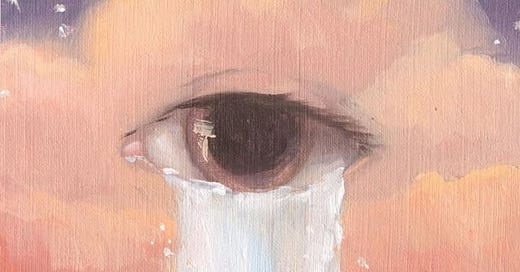Most days, I forget that I have herpes. A decade ago, that felt impossible.
I don’t think about a blue pill I have to take or worry about how I’m going to tell my next partner “the news.”
I start and end my days like many people do. With breakfast and coffee and books and routines. Doomscrolling and snuggling my cat, binge watching my favorite television series to distract me from the current realities in the United States.
When I first was diagnosed with herpes ten years ago, I was immediately consumed by it. My emerging writing shared some of my first thoughts. A feeling turned into a poetic line I’ll never forget: Who will love me? Now that I have this...
At the time, my hope was slim, and I felt almost that destiny bonded me to the man who gave it to me. As if there had to be some divine intervention or greater reason in my journey that I got herpes other than statistical inevitability.
Some people ignore their pain or bury it hoping it’ll lessen over time, others want to feel it all. I was somewhere in between. I buried a lot of emotion in binge-drinking, something that felt almost expected in the town where I lived at the time. But there was a part of me that desperately needed to feel, which is why I wrote.
I don’t think I realized it at the time, but in retrospect, writing was a large part of my healing process. I’ve written before about how community, education, and movement were key pieces for me, but writing was also a part of that movement.
Every keyboard stroke or diary entry, or even the way my tongue moved when it said the word, herpes, made meaning. The more I talked about it, the more I felt like I owned it. And the more I owned it, the less I needed other people to own it for me.
Herpes literally stems from a Greek word meaning to creep, but its impact on those diagnosed is often anything but sneaky. It hits you. Like you’re waiting for the next subway train but suddenly it veers off the track and slams into you. You’re diverted from your destination, not even wondering if you’ll make it, but if you’ll survive the impact.
Over the years, I’ve talked less about my story with herpes. Part of that lends itself to healing, I think.
There was a part of me that intentionally talked less about my experience with herpes because I didn’t want people to think of it as the experience, especially as a white woman. With increasing numbers of “herpes coaches” monetizing their experience in collusion with big wellness, I didn’t want people to lump me in with their fallacies and MLM schemes.
Now, when I criticize herpes coaches, I get backlash. Some newer followers don’t even know I have herpes since I’ve talked about it less. After commenting about the damage of herpes coaches on an Instagram post, a user wrote this in reply: “I’d much rather have someone who understands what it’s like to live with herpes than someone who studied about it.”
Clearly, there’s a part of me that does struggle with these types of comments. They bear some truth. It’s why I, as a sexuality professional, started talking about my diagnosis in the first place. I knew it set me apart from the others.
Unfortunately, even though “sex” is in my Instagram handle, Instagram’s censorship of words like herpes and sex has wavered over the years, making it nearly impossible to include that differentiation in my profile.
There’s a part of me that feels like I failed myself in trying to fit a mold, all while doing my best to protect a community from harm, greed, and manipulation.
The other part of me stopped talking about herpes because it naturally became boring to me. Yes, boring. The same way a scar becomes boring after you've told the story of how you got it a thousand times. The same way a tattoo becomes boring after everyone asks its meaning.
I know the herpes statistics and facts by heart. I’ve written about dating, anxiety, disclosure, rejection, heartbreak, and more ad nauseam. I’ve written about my experience with each countless times over the last ten years.
Yes, herpes is a fact about my life, but it’s no longer something that consumes me. I think even looking at my writing, it’s evident. While I’ve had powerful and emotional takes over the years, some stand out among the rest. Particularly those when I’m newly diagnosed. During graduate school, my writing leaned more heavily into academia (which isn’t surprising).
Now, I find myself in a position where I’m trying to balance the beauty and depth of my early writing, while also interweaving some of the statistics and research, and being true to myself. And I find some of my followers don’t like where I am now.
Herpes is the last thing I want people to know about me. Not because I’m ashamed by it, but because it quickly lends itself to me becoming a specimen. Instead of a woman with interests, a career, and a heart, I am a case to be studied. A case in weird, a case in feminism, a case in “Why did you spread your legs so young?" or “Why so public?”
This response is common for those in the sexuality field, but the added layer of my diagnosis and specialization sometimes makes me feel like an anomaly rather than Emily.
There are those men who accepted me and bowed to my expertise, only to shut my mouth, my interests, and dim my light by the end of our relationship. There are those who fawn at my looks and beauty, only to shy away at the prospect of getting herpes and becoming obsessed with transmission statistics and what-ifs. I become an in-house educator and Stepford wife when all I wanted to be seen for was me.
Some of my best writing is my herpes writing because of the emotions and insight into my vulnerability and the places people don’t always gain access to. But that same depth and vulnerability in my writing is evident at other intersections of my life, too.
Because I have made myself so vulnerable talking about such a stigmatized topic, people feel entitled to every crevice of my story. Not just the many pieces publicly available on the internet, but more intricate questions. Like, “Did you use a condom?” and “What do your outbreaks look like?”
While I have shared so much of myself and my story publicly over the years, many of the questions people have about my experience really don’t matter. They actually further prove that stigma is alive and well. I’m less interested in talking about if and how my experience of herpes breaks the statistical mold, and am more interested in hearing your story. Rather than continually dissecting my own experience, I want to help people find their path forward after diagnosis.
Some of my followers preferred me when I was stuck in my diagnosis. To be the sad writer, the girl on the examination table, the public martyr for herpes in perpetuity. Taking the brunt of the comments, giving out free advice, offering myself up as a sacrifice for stigma.
Stepping away from constantly telling my herpes story wasn't just about personal healing—it was also about resisting the expectation that I should be defined by it forever.
Yes, I know exactly what it’s like to feel that your world is ending because of a herpes diagnosis. Yes, I know what it’s like to fear rejection when you’re exposing the fresh wound of a positive herpes status. Yes, I know what it’s like to wonder if your love life has a future.
I lived there for a period of my life, but it is not my obligation to stay there. I did the work because I wanted more from my life than what society told me my life could be with herpes. I wanted more than stigma, and more importantly, I want more for you, too.
Healing isn't betrayal. Growth isn't abandonment. Outgrowing my despair and darkness from herpes doesn’t mean I can’t relate, it means I am living proof that you can do it, too.
Note to readers: This type of deeply personal writing is typically reserved for paid subscribers. However, I wanted to share this reflection on my decade-long journey with herpes with all of you because I believe stories of healing and growth deserve to be widely accessible. If this resonated with you and you'd like more content that explores vulnerability, identity, and personal transformation, please consider becoming a paid subscriber for $5/month or $55/year.







Thank you for this writing. It is validating. I appreciate your candor.